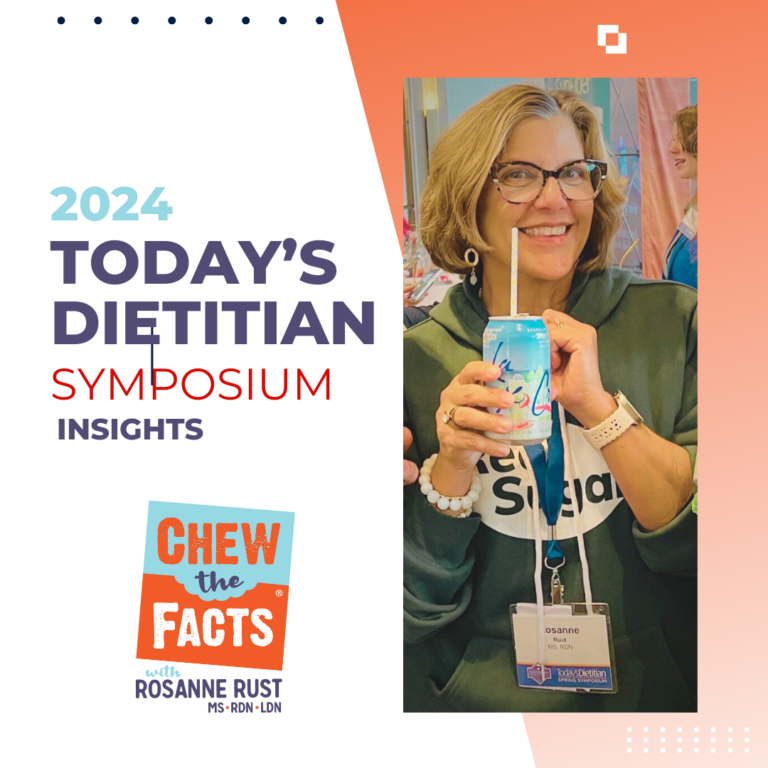Screenshot
I just got back from Salt Lake City where the annual Today’s Spring Dietitians Symposium was held. Here is a quick recap.
GLP-1 Meds and You
I attended a session on weight management and new concerns and considerations for those taking GLP-1 medications. Dr. Su-Nui Escobar spoke about nutritional therapy for patients taking GLP-1 drugs. Many people taking these medications need some special care when planning meals and snacks. Dr. Escobar emphasized the importance of meal planning to ensure a healthy meal pattern in these patients who often have a poor appetite.
Gen Z’s perceptions of food and health
This session took a deep dive into some of the data collected about Gen Z. Dietitian Jaclyn London presented the data and offered some insight on how to better communicate with this demographic and encourage healthy lifestyle habits. Interestingly, Gen Z ranks climate and planetary health very high on their priority list. However, they don’t always make choices that align with this. Furthermore, their perceptions of food and nutrition are often different from what they practice. While they may be “falling” for the latest diet trend, the good news: they’re open to learning from health experts like a registered dietitian. This is a generation that was practically “born digital” but wants opportunities to go offline. Some of them are even adopting flip phones as a way to be “less connected”.

Plants VS Animals
I’ve mentioned before that “plant-based” is hot, and it was on the agenda at this conference. Throughout the conference, there was certainly some buzz about how various industries are collecting data on the impact of food on the environment. One session shared thoughts on adopting the Dietary Guidelines for Americans, which may include small portions of meat and animal products (ie, there need not be “an omnivore’s dilemma”). While two other sessions focused on switching to a plant-based diet. A session he presented Sharon Palmer and Kate Geagan shared some global data about the environmental impacts of food production, including the carbon footprint of animals. I personally believe that a sustainable food system can include plants and animals. Other parts of the world can learn many sustainable practices from US farmers and ranchers, including regenerative farming operations.

One Hot Planet – It’s Complicated!
I just read that NOAA is predicting a severe hurricane season. I have always enjoyed my natural surroundings and care deeply about the planet and our beautiful world. I am aligned with many of Food+Planet’s Mission. However, here’s my question: What if we did away with animal agriculture (or at least cows) and switched to a plant-based diet? Since only 17% of US land is arable (and only 10% of the world’s land), how can we provide enough food for everyone? It’s complicated!
I agree that overall, we need to rely less on meat and balance our dishes. And in general, eat less food overall! I definitely encourage everyone to add more fruits and vegetables to their diet. However, I don’t think it’s realistic to think that everyone, in every culture is interested in becoming vegan (nor was that brought up in this session). Note – the Dietary Guidelines for Americans recommend filling half your plate with vegetables and limiting your consumption of red meat and limiting servings of all meats to about 5-7 ounces or less daily. If we all adhered to this, we would reduce demand.
From an environmental perspective, food is only one part of the bigger picture climate and greenhouse gas theme. I have more questions than answers when it comes to how data is collected and measured. There are other concerns and in many ways for data interpretation. For example, while the data collection shows beef as the top consumer of resources and emits the most greenhouse gases of any food, this data takes into account all other industries by-products created by the animal other than meat? What will be the environmental impact of replacing these components? Food for thought!
Network of friends
Of course the best part of going to these conferences for my continuing education is that I get to see my friends. Working solo from home can get lonely and it’s always great to see people in person.

Finally, in addition to the sessions, I had the opportunity to work at the Sugar Association booth. Sugar? At a nutrition conference? Well, yes, sugar is part of the food system. The Sugary Club represents the farmers who grow sugar cane and sugar beet. I do some consulting with them on the education side, including creating science-based educational materials, and I talked to attendees about those materials at the expo booth. In 2021 they called me tour of a sugar beet farm, which was fantastic. I love meeting the farmers who bring our food supply to market. All in all, this was a great conference – and by the way, Downtown Salt Lake City is beautiful!
